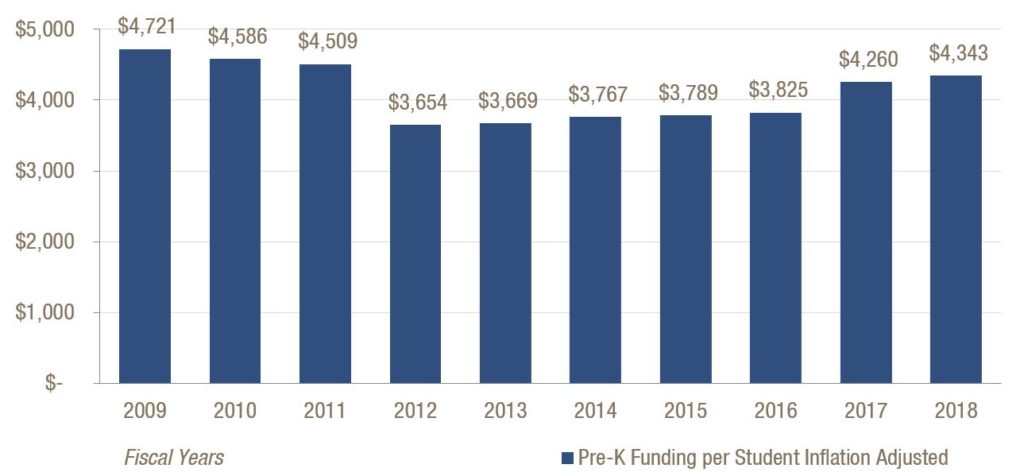Gov. Nathan Deal’s proposed 2018 budget includes $57.4 million in additional lottery funds, bringing the combined total for Georgia’s lottery funded Pre-Kindergarten and HOPE financial aid programs to $1.13 billion. About $757 million of that total is allocated to the HOPE program, and the remaining $364 million is directed to Pre-K. The most significant funding changes in these programs include an increase of nearly $50 million to boost HOPE award amounts by 3 percent and keep pace with program growth and a $5.2 million bump for Pre-K teacher salaries. The governor made no substantial changes in his proposed 2017 amended budget.
By the Numbers
2018 Fiscal Year Budget
Proposed funding for the Pre-Kindergarten program will increase about $7 million from the 2017 budget, to a total of $364 million. The 2018 increase includes:
- $5.2 million for a 2 percent pay raise for teachers as part of a statewide hike for merit pay and recruitment and retention initiatives for state employees
- $1.8 million for to boost the employer’s share of payments to the Teacher Retirement System
Proposed spending for the HOPE financial aid programs grows $50.4 million, to a total of about $757 million. The increase includes:
- $49.3 million for HOPE Scholarship-Public Schools and the Zell Miller Scholarship to keep pace with growth and raise the award amount
- $515,441 for HOPE Scholarship-Private Schools to increase the award amount for HOPE and Zell Miller Scholars
Funding for the Student Access Loan program, which provides low-interest loans to students who need financial help, remains at $27 million for the third year in a row. State investment in the loan program is now well below what is needed for additional financial support for postsecondary students. The university system estimates 112,256 students had unmet financial need totaling $808 million, even after receiving a $5,500 subsidized loan in the 2014-2015 academic year.
Pre-Kindergarten
Money added to the 2018 budget to increase teachers’ salaries 2 percent promises to bump up the pay of lead teachers with a bachelor’s degree and professional certification about $700 for an annual salary of about $35,800. Assistant teachers are set for an increase of about $300 for an annual salary of about $16,000. These increases build on the pay raises Pre-K teachers got in the 2017 fiscal year, a key step to improving low teacher retention in the program.
Funding for the Pre-K program on a per-student basis remains about 8 percent below 2009 levels when adjusted for inflation, even after the recent increases.
Pre-K Funding Remains Below 2009 Level

Reduced funding levels means critical steps to improve the Pre-K program’s quality and availability are unlikely. Class size is likely to remain at 22 students. This is above Georgia’s previous class size maximum of 20 students, which is the class size recommended by the National Institute for Early Education Research[1]. Nor is there an increase forthcoming for program start-up and operating costs, steps recommended by the governor’s Education Reform Commission. State funding to cover these expenses often falls below the actual cost that Pre-K providers incur, which deters them from starting new programs. This leaves high-demand communities without enough slots for the families who want to enroll their children. The statewide waiting list is now about 5,000.
HOPE Financial Aid Program
The HOPE financial aid program serves students in postsecondary programs in a variety of ways. The HOPE Scholarship covers a portion of tuition for students who graduate from high school with a 3.0 grade point average and who take four classes identified as rigorous including Advanced Placement courses. Students must maintain a 3.0 GPA to retain the scholarship. It is available to students in public and private postsecondary institutions in associate or bachelor degree programs. The Zell Miller Scholarship is awarded to students who graduate from high school with a 3.7 GPA, four rigorous classes and a 1200 score on the SAT or 26 on the ACT exams. They must maintain a 3.3 GPA in college to retain the scholarship, which covers full tuition.
The HOPE Grant covers a portion of tuition for students in certificate or diploma programs in either the technical college or university postsecondary system. Most recipients attend technical colleges. Students must maintain a 2.0 GPA to retain the grant. The Zell Miller Grant is awarded to students in certificate or diploma programs who maintain a 3.5 GPA.
Funding for the HOPE Scholarship for students in public schools increases $49.3 million in the proposed 2018 budget to keep pace with projected growth and increase the award amount by 3 percent. About $10.9 million of that is directed to the Zell Miller Scholarship program, which has grown about 12 percent annually.
The HOPE Scholarship for students in private institutions is increasing by $515,441. This addition supports an increase of 3 percent in the award amount for HOPE and Zell Miller scholars.
HOPE Grant funding remains at $109 million, the same as the 2017 fiscal year level. Program expenses ran below the allotted amount for the past several years as enrollment in technical colleges fell. This amount is sufficient to cover a 3 percent increase in the grant award amount as well as for the Zell Miller Grant.
Both postsecondary systems raised tuition and fees over several years to offset decreased state funding. Both kept tuition flat in 2017, the second year in a row for technical colleges. If potential tuition increases for the 2017-2018 academic year are kept below 3 percent, the HOPE Scholarship and HOPE Grant will cover a larger portion of tuition than is now the case.
[1] National Institute for Early Education Research. (2015) 2015 State of Preschool Yearbook. Retrieved from http://nieer.org/wp-content/uploads/2016/05/Yearbook_2015_rev1.pdf.



